Berisi 100 Moment special di Old Trafford sebagai bagian dari perayaan 100 tahun OT. Artikel ada di ManUtd.com, namun hanya mereka yang member One United yang bisa mengakses. Jadi saya post disini agar bisa dinikmati semua
Special Thanks to Mark who post it Earlier
OT 100 #1: Opening day
To celebrate Old Trafford's impending 100th birthday, ManUtd.com runs through the 100 greatest moments in the stadium's history. First up, naturally, is the first game to be staged in M16...
Open for business
19 February 1910
United 3 (Turnbull, Homer, Wall)
Liverpool 4 (Goddard 2, Stewart 2)
Attendance: 45,000
United: Harry Moger, George Stacey, Vince Hayes, Dick Duckworth, Charlie Roberts, Sam Blott, Billy Meredith, Harold Halse, Tom Homer, Sandy Turnbull, George Wall
Liverpool: Sam Hardy, Tom Chorlton, Tom Rogers, Robbie Robinson, James Harrop, James Bradley, Arthur Goddard, James Stewart, Jack Parkinson, Ronald Orr, John McDonald
Press reaction: "The most handsomest [sic], the most spacious and the most remarkable arena I have ever seen. As a football ground it is unrivalled in the world, it is an honour to Manchester and the home of a team who can do wonders when they are so disposed".
The Sporting Chronicle
The background: United chairman John Henry Davies stumped up £60,000 of his own money for the construction of a new stadium in 1909, enlisting Scottish architect Archibald Leitch, the mastermind behind Hampden Park, to design it. After months of construction by Messrs Brameld and Smith of Manchester, United swapped Bank Street for Old Trafford and the new ground was ready to host its first game: United vs Liverpool.
The occasion: On a pitch "as spick and span, as smooth, and as green as a billiard table," according to The Manchester Guardian, United roared into a 3-0 lead through Sandy Turnbull's diving header and further strikes from Tom Homer and George Wall. However, the visitors hit back with braces from Arthur Goddard and James Stewart to eventually edge a thrilling game.
The aftermath: Defeat to Liverpool, who finished second behind Aston Villa, was United's only setback at Old Trafford during 1909/10. The Reds took maximum points from all seven remaining homes games and finished fifth in the First Division - a marked improvement on finishing 13th a year earlier.

The OT100 list continues with 1911's FA Cup Final replay between Bradford City and Newcastle United - the first time the final of England's leading cup competition came to M16...
Bantams take the trophy
26 April, 1911
Bradford City 1 (Speirs)
Newcastle United 0
Attendance: 58,000
Bradford City: Mark Mellors, Robert Campbell, David Taylor, George Robinson, Bob Torrance, Jimmy McDonald, Peter Logan, Jimmy Speirs, Frank O'Rourke, Archie Devine, Frank Thompson
Newcastle United: Jimmy Lawrence, Billy McCracken, Tony Whitson, Colin Veitch, Wilf Low, David Willis, Jock Rutherford, George Jobey, Jimmy Stewart, Sandy Higgins, George Wilson
The Background: In the days before the construction of Wembley, the FA held its showpiece final at Crystal Palace. Reigning cup holders Newcastle took on Bradford in London, but could only muster a goalless draw. Four days later, the sides reconvened at Old Trafford, where a crowd of 58,000 were shoehorned in for an evening of much graft, but little guile.
The Occasion: Bradford captain Jimmy Speirs headed the only goal of the game after 15 minutes - while thousands of fans were still queuing outside - to seal City's one and only major honour. Fittingly, the brand new trophy he clutched at full-time had been crafted in Bradford by renowned jeweller Messrs Fattorini and Sons.

The Aftermath: The FA were so impressed by the smooth nature of Old Trafford's staging, that United were approached to host another final four years later.

OT 100 #3: Khaki Cup Final
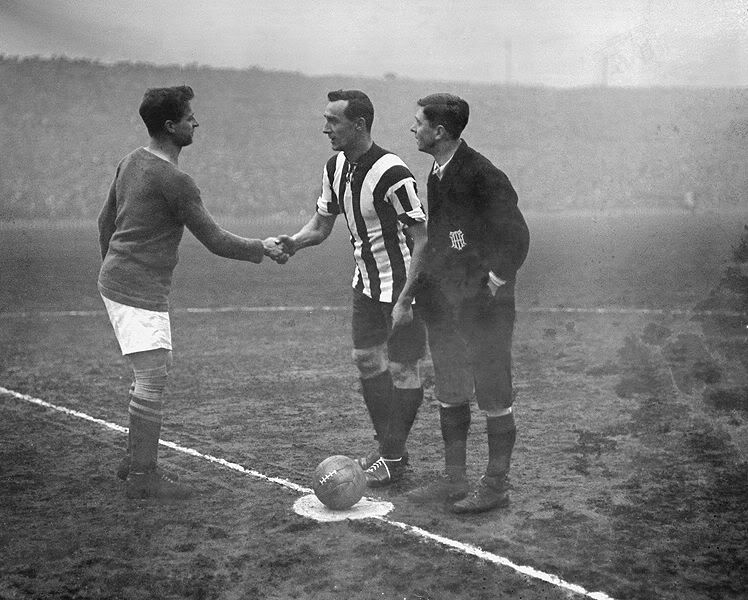
Amid controversy over the continuation of football during the First World War, Old Trafford played host to the 1915 FA Cup Final between Sheffield United and Chelsea...
Blades blunt Blues
24 April 1915
Sheffield United 3 (Simmons, Fazackerley, Kitchen)
Chelsea 0
Attendance: 49,557
Sheffield United: Harold Gough, Billy Cook, Jack English, Albert Sturgess, Bill Brelsford, George Utley, James Simmons, Stanley Fazackerley, Joseph Kitchen, Wally Masterman, Robert Evans
Chelsea: Jim Molyneux, Walter Bettridge, Jack Harrow, Fred Taylor, Tommy Logan, Andy Walker, Harry Ford, Harold Halse, Bob Thomson, Jimmy Croal, Bob McNeil
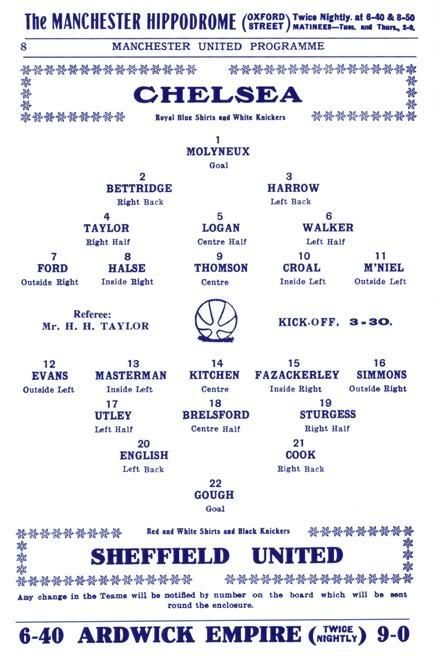
The background: Four years after hosting the FA Cup Final replay, OT was chosen as the venue for the Final itself. The matchday programme, produced by United, trumpeted: "The home of Manchester United (is) a splendidly equipped and commodious enclosure." A huge proportion of the near-50,000 attendance was made up by the armed forces, leading for the game to be subsequently dubbed 'The Khaki Cup Final'.
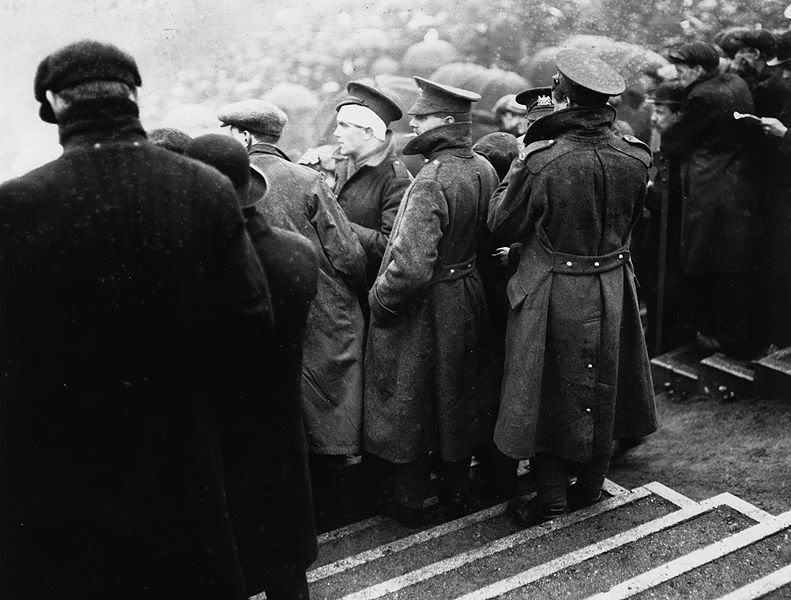
The occasion: Sheffield United were the overwhelming pre-match favourites, and dominated proceedings before taking the lead through James Simmons on the stroke of half-time. Late goals from Stanley Fazackerley and Joseph Kitchen sealed a deserved victory for the Blades - their third victory in the competition.
The aftermath: Upon presenting the trophy, the Earl of Derby urged all supporters present that they needed to join together and play "a sterner game for England," in reference to the ongoing First World War. Shortly after the 1915 final, the FA Cup and Football League were both suspended until 1919, after the war had finished.
OT 100 #4: Bye bye, Billy
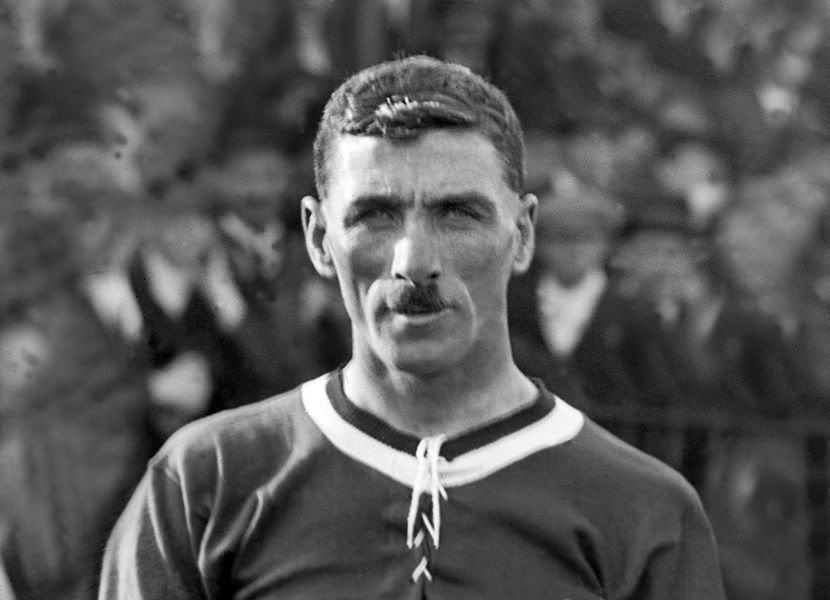
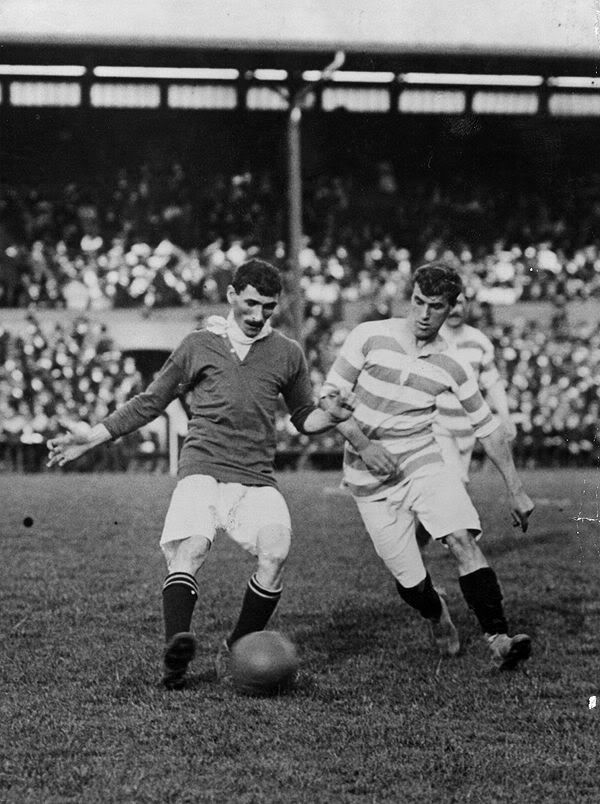
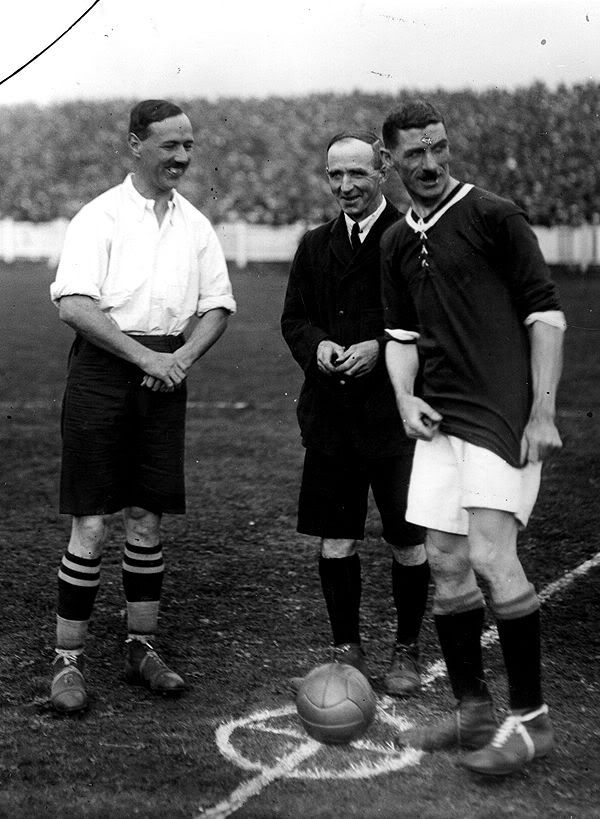

[b]Ryan Giggs may have fall into the bracket of a veteran Welsh winger, but Giggsy looks just a young pup when compared to one of his forebears; the charismatic Billy Meredith...
Name: William Meredith
Born: 30 July 1874, Chirk, Wales
Died: 19 April 1958, Manchester
Position: Outside forward
Debut: v Aston Villa (h), 01/01/1907
Stats: 335 appearances, 36 goals
The Background: Billy Meredith was one of football's first showmen. A former pit pony driver, the toothpick-chewing, tobacco-spitting Welshman joined Manchester City in 1892 and had a distinguished decade with the Blues. He left disgraced and banned for 18 months, however, amid allegations of bribing Aston Villa's Alex Leake to throw a game, and crossed to Old Trafford in May 1906. Meredith, a tricky, two-footed outside forward, quickly won the favouritism of the United support. His showmanship continued, with an especially eye-catching knack of lobbing penalties. He went on to make 335 appearances for the Reds in a legendary career which finally ended in May 1921.
The Occasion: With United marooned in mid-table, a paltry crowd of just 10,000 made it to M16 to see the Reds take on Derby County, unaware that it would be Meredith's final appearance. United did thanks to goals from Joe Spence (2) and George Sapsford, but Meredith, even playing with his customary toothpick in his mouth, but couldn't find a goal to round off the occasion.

The Aftermath: Even at 46, Meredith's career wasn't finished. He returned to City for another three seasons, and retired just shy of his 50th birthday, after the Blues' FA Cup semi-final defeat to Newcastle United.

OT 100 #5: Pape switches sides
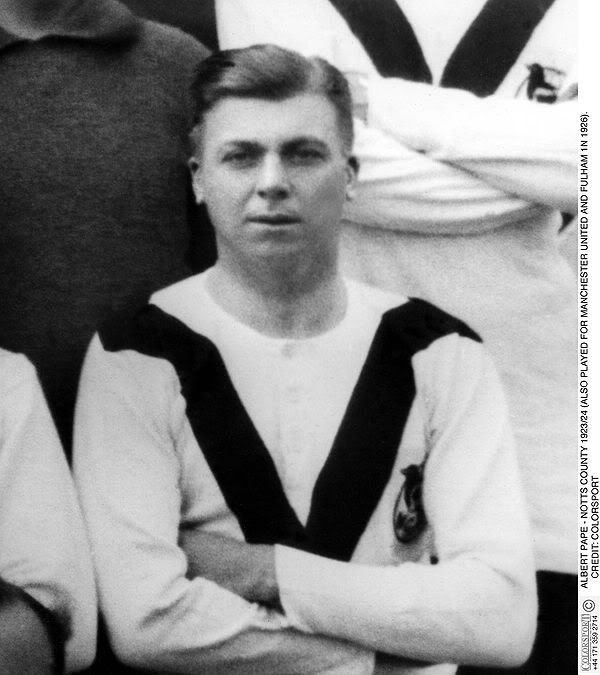

[b]One of the most bizarre transfer tales in United's history came in 1925, when Albert Pape arrived at Old Trafford as an opposition player, but lined up for the Reds...
Name: Albert Pape
Born: 13 June 1897, Elsecar
Died: 18 November 1955, Doncaster
Position: Centre forward
Debut: v Clapton Orient (H), 7 February 1925
Appearances: 18
Goals: 5
The Background: The sale of Bill Henderson left United short on strikers ahead of the visit of Clapton Orient (latterly Leyton Orient). Before the visitors left London for Manchester, the two clubs agreed that Orient striker Albert Pape could sign for United. The Football Association quickly ratified the deal as Pape travelled north with his soon-to-be-former team-mates.
The Occasion: Even though Pape had been named in the visitors' starting line-up, he donned the United strip. Not only did the Reds win, but Pape had the last laugh against his former club by getting on the scoresheet in a 4-2 triumph.
The Aftermath: Pape's United career spanned a mere 18 games and yielded five goals. Having played his part in the Reds' promotion from Division Two, he made only three appearances in Division One and was sold to Fulham. The two sides met just five months later in the FA Cup. Again, Pape haunted his former employers with a goal, but United won through 2-1.
OT 100 #6: Going global
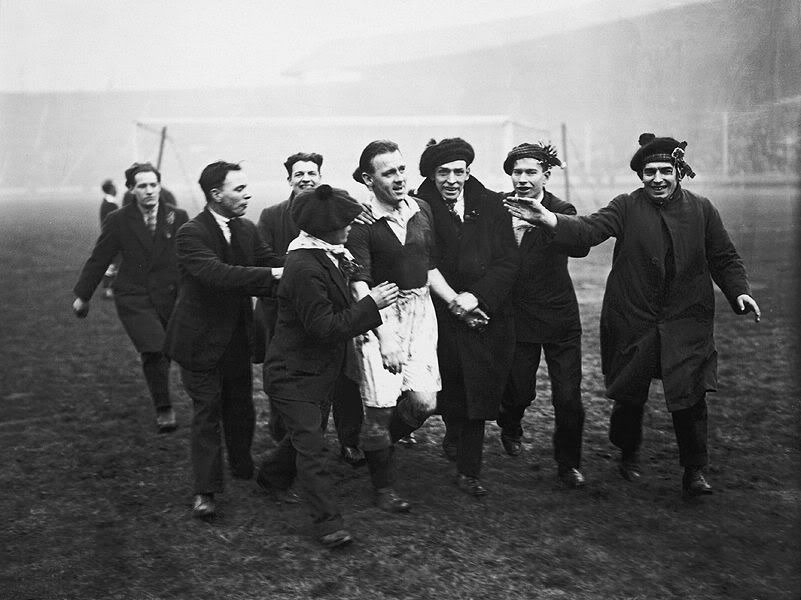
Well established as one of England's premier football venues after 16 years as United's home, Old Trafford was chosen to host its first international...
OT hosts the Auld Enemy
17 April, 1926
British Home Championship
England 0
Scotland 1 (Jackson)
Attendance: 49,429
England: Teddy Taylor, Roy Goodall, Tommy Mort, Willis Edwards, Jack Hill , George Green, Dicky York, Syd Puddefoot, Ted Harper, Billy Walker, Jimmy Ruffell
Scotland: Bill Harper, Jock Hutton, Willie McStay, Jimmy Gibson, Willie Summers, Jimmy McMullan, Alec Jackson, Alec Thomson, Hugh Gallacher, Andy Cunningham, Alec Troup
The Background: The Football Association had been suitably impressed by the smooth running of the 1911 FA Cup Final replay and the 1915 Final proper in M16. Thus, when Wembley drew a poor crowd for the 1924 British Home Championship clash between England and Scotland, Old Trafford was quickly enlisted as an alternative international venue when the teams met at the 1926 Championship.
The Occasion: England were struggling with a point from two games, while Scotland were already assured of the title after hammering Wales (3-0) and Ireland (4-0) in their opening two games. The typically fiery encounter went with form, as Alec Jackson's early strike gave the Scots a comfortable victory and banished England to bottom spot of the four-team table, a place the Three Lions occupied only thrice in 89 tournaments.
The Aftermath: While OT has hosted a string of England international fixtures since - most notably during the redevelopment of Wembley in the earlier part of this millennium - this remains the only time the Auld Enemy have done battle in M16.
OT 100 #7: Last day drama
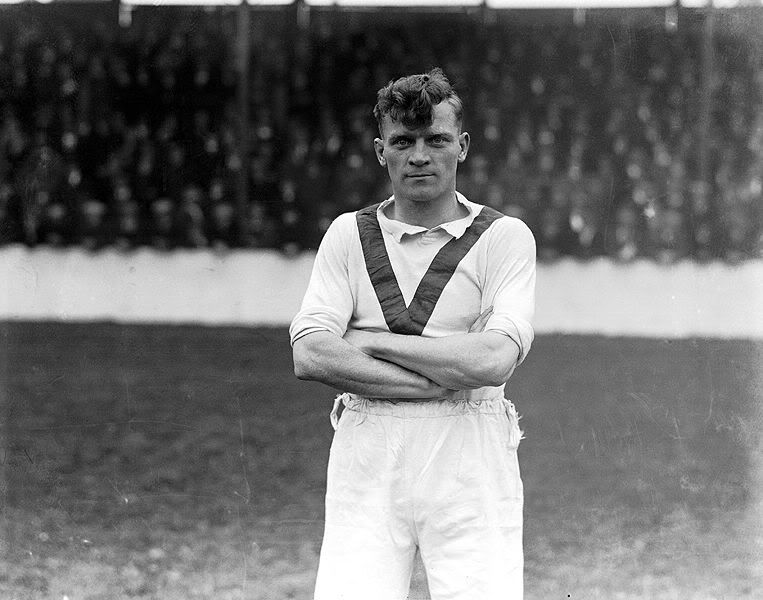
Going into the final day of the 1927/28 season, only goal difference separated the Reds from the foot of the table...
United 6 Liverpool 1
5 May, 1928, Old Trafford
Manchester United 6 (Spence 3, Rawlings 2, Hanson)
Liverpool 1 (Hodgson)
Attendance: 30,625
United: Steward, Moore, Jones, McLenahan, Mann, Wilson, Spence, Hanson, Rawlings, Johnston, Thomas.
Liverpool: Riley, McBain, MacKinlay, McMullan, Jackson, Bromilow, Edmed, Hodgson, Murray, Race, Hopkin.
United's top five wins v Liverpool:
05/05/28 - United 6 Liverpool 1 (League)
11/09/46 - United 5 Liverpool 0 (League)
19/12/53 - United 5 Liverpool 1 (League)
07/09/07 - United 4 Liverpool 0 (League)
12/04/52 - United 4 Liverpool 0 (League)
The Background: After a poor season's work, United were in dire straits going into the final three games of the campaign. Narrow wins over Sunderland and Arsenal provided a platform for survival, but the Reds hosted Liverpool on the final day of the season firmly entrenched in trouble. Joint-bottom with Burnley, the Reds needed victory and help from elsewhere.
The Occasion: Step forward Joe Spence. The Reds' leading scorer plundered a hat-trick to take his season's total to 24 goals, while further strikes from Bill Rawlings (2) and Jimmy Hanson ensured United's record victory over Liverpool came with priceless timing.
The Aftermath: Tottenham had already finished their season with 38 points, and were overhauled by both United and Burnley. The same fate befell Middlesbrough, 3-0 last-day losers at home to Sunderland, thus the Reds escaped relegation by a solitary point. Demotion was only staved off temporarily, however, as United finished bottom in 1930/31 and spent several years yo-yoing between the top two divisions thereafter.
OT 100 #8: Record gate
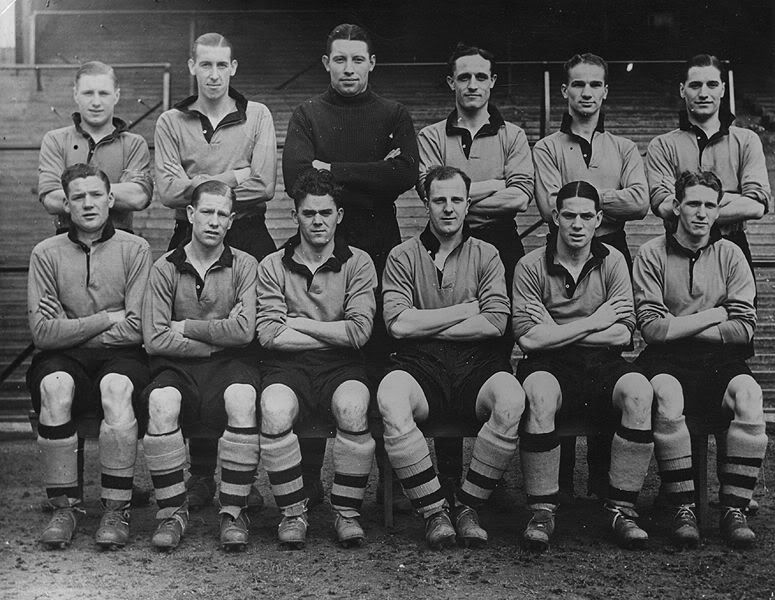
Curiously, Old Trafford's record attendance didn't even come in a United game. 76,962 supporters crammed into the stadium to see Grimsby take on Wolves in the 1939 FA Cup semi-final...
OT's record United crowds
1. 31/03/07 v Blackburn (76,098)
2. 13/01/07 v Aston Villa (76,073)
3. 17/03/07 v Bolton (76,058)
4. 31/01/07 v Watford (76,032)
5. 26/12/06 v Wigan (76,018)
6. 03/05/08 v West Ham (76,013)
7. 04/11/06 v Portsmouth (76,004)
8. 23/03/08 v Liverpool (76,000)
9. 13/04/08 v Arsenal (75,985)
10. 10/02/08 v Man City (75,970)
All fixtures Barclays Premier League.
*United's all-time top three attendances all came at Maine Road, v Bradford Park Avenue (82,771 in 1949), Arsenal (81,962 in 1948) and Yeovil Town (81,565 in 1949).
The Background: Just because United had exited the FA Cup in a third round replay - drubbed 5-1 at home by West Brom - didn't mean Old Trafford had seen its last knockout action of the season. Grimsby and Wolves met in M16 for the right to face the winner of Portsmouth and Huddersfield.
The Occasion: Already weakened by the absence of first-choice goalkeeper George Tweedy, Grimsby's plight worsened when his replacement, George Moulson, was injured early on. In the days before substitutes, the Mariners soldiered on with 10 men. Predictably, they were crushed. Wolves striker Dennis Westcott bagged four goals - en route to a season haul of 43 in as many games - while Tom Galley added a fifth.
The Aftermath: High-flying Wolves were crushed 4-1 by struggling Portsmouth in the final, with salt rubbed into the midlanders' wounds as Pompey held onto the trophy throughout World War II. OT's attendance record, meanwhile, cannot be beaten unless the capacity is further extended; it currently stands at 75,797.
OT 100 #9 Back home
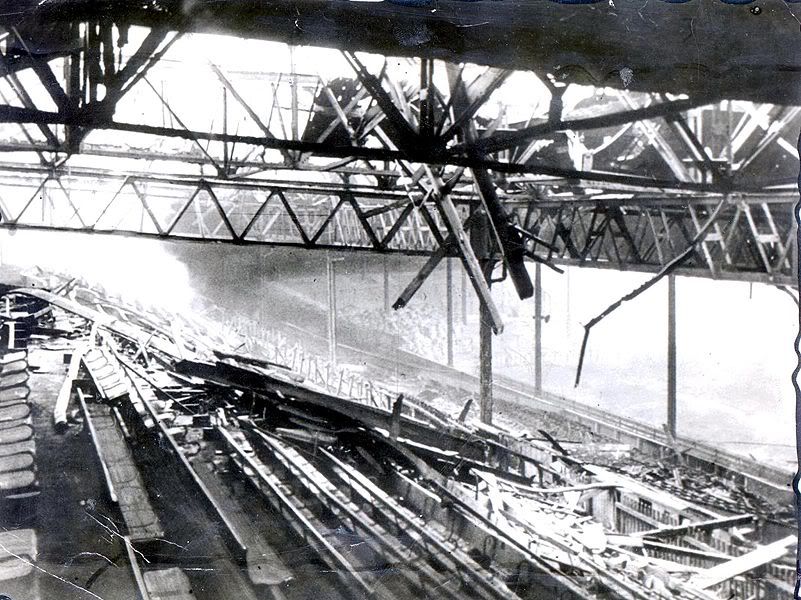
Old Trafford, devastated during World War II, was rebuilt over the course of nearly a decade. And at the start of the 1949/50 season, the Reds were back home...
"There were schoolboys - including Dennis Viollet - lined up on each touchline at Old Trafford, and we walked across the stadium with buckets collecting glass out of the pitch, filling up buckets with glass and rubble from the blast."
- Manchester artist Harold Riley
The Background: Old Trafford was twice struck by German Luftwaffe bombs; causing minor damage in December 1940 and then destroying much of the South Stand in March 1941. Manchester City offered to host United’s home games at Maine Road – at a variable cost including a percentage of the gate - while rebuilding work was undertaken. Almost a decade later, an uncovered OT was ready to host matches at the start of the 1949/50 season.
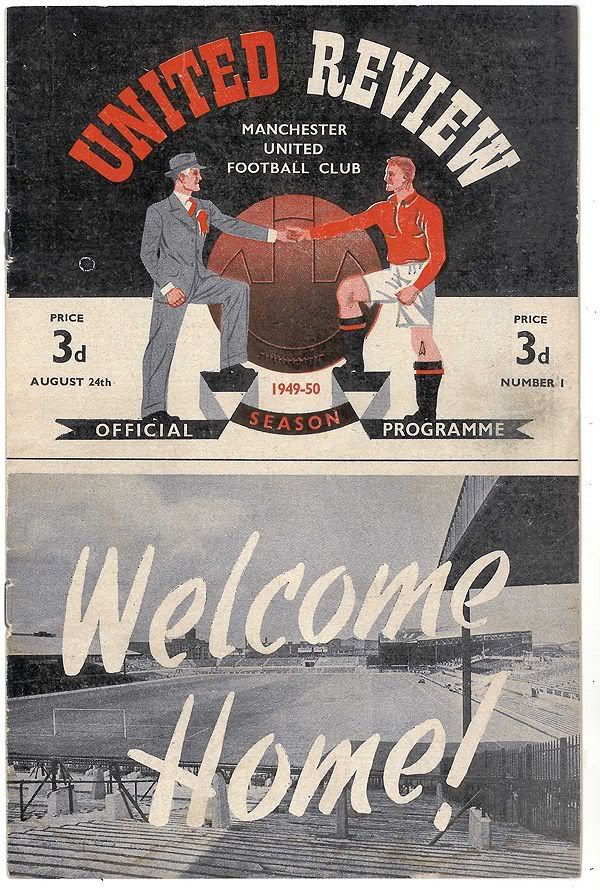
The Occasion: 41,748 spectators crammed into the stadium to see United take on Bolton Wanderers on a balmy August evening. Charlie Mitten, Jack 'Gunner' Rowley and an own-goal gave the Reds a resounding 3-0 victory, and hailed a triumphant return to home soil.
The Aftermath: Prior to the bombing, Old Trafford had undergone extensive - and expensive - roofing work to shelter the North Stand, in addition to the already-covered South Stand. After the almighty setback, and armed with some £22,000 from the War Damages Commission, the club eventually restored the original roofing and also covered the Scoreboard End and Stretford End.
Tidak ada komentar:
Posting Komentar